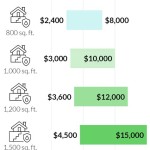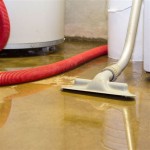Basement Flooding After Heavy Rain: Essential Aspects to Consider
Torrential rainfall can lead to devastating basement flooding, causing immense stress and financial damage to homeowners. Understanding the core aspects of basement flooding and implementing preventative measures is paramount to minimize its impact. Here's a comprehensive guide highlighting the essential factors associated with basement flooding after heavy rain.
1. Causes of Basement Flooding
Basement flooding during heavy precipitation primarily stems from two main causes:
- Saturated Ground: Prolonged rainfall saturates the soil surrounding your home, increasing the hydrostatic pressure on basement walls. If the walls are weak or have cracks, water may seep through, leading to flooding.
- Stormwater Runoff: When storm drains become overwhelmed or clogged, excess water accumulates on the ground surface. This runoff can flow towards your home's foundation, pooling around the basement level and potentially finding entry points.
2. Impact of Basement Flooding
Basement flooding poses numerous detrimental consequences, including:
- Property Damage: Water damage can severely affect carpets, flooring, furniture, and personal belongings stored in the basement, leading to costly repairs or replacements.
- Structural Issues: Prolonged flooding can weaken basement walls and floors, potentially compromising the structural integrity of your home.
- Mold and Mildew: Damp basements provide an ideal environment for mold and mildew growth, creating health hazards and unpleasant odors.
3. Prevention Strategies
To prevent basement flooding during heavy rain, consider implementing these critical measures:
- Improve Drainage: Ensure gutters and downspouts are clear of debris and direct water away from your home's foundation. Consider installing a sump pump to remove excess water from your basement.
- Seal Cracks and Openings: Inspect basement walls and floors for cracks or gaps around windows, doors, pipes, and vents. Seal them with waterproof caulk or sealant to prevent water penetration. li>Install a Backflow Prevention Valve: Backflow prevention valves prevent wastewater from flowing back into your home through drains and pipes, minimizing the risk of flooding.
4. Response Plan
In the event of basement flooding after heavy rain, take immediate action to mitigate damage:
- Shut Off Utilities: Ensure your safety by shutting off electricity, gas, and water supplies to the basement. li>Remove Excess Water: Use a wet/dry vacuum or pump to remove as much water as possible.
- Dry and Disinfect: Thoroughly dry the basement using fans and dehumidifiers. Disinfect affected areas to prevent mold and mildew growth.
5. Insurance Considerations
Homeowner's insurance typically covers flood damage to some extent, but it's vital to understand the specifics of your policy. Consider purchasing additional flood insurance if your area is prone to flooding.
Conclusion
Basement flooding after heavy rain can be a stressful and damaging event. By understanding the causes, potential impacts, and implementing preventative measures, homeowners can minimize the risks and protect their property. Regularly inspecting and maintaining drainage systems, sealing potential entry points, and having a response plan in place are essential steps to mitigate the effects of basement flooding.

What To Do If Basement Floods Every Time It Rains Expert Advice

6 Simple Ways To Prevent Basement Flooding American Dry

Basement Waterproofing Lewes De Flooded After Heavy Rain Storms And Sump Pump Failure

Why Your Basement Leaks In Heavy Rain

Why Your Basement Leaks In Heavy Rain Mt Drains Plumbing

How To Prevent Basement Flooding During Heavy Rain

Here S Why Your Basement Flooded Even When You Have A Sump Pump Forbes Home

Help My Basement Leaks When It Rains News And Events For Systems Inc

Basement Flood Cleanup After Heavy Rains The Waterproof Group

What To Do During A City Sewer Backup From Heavy Rain







